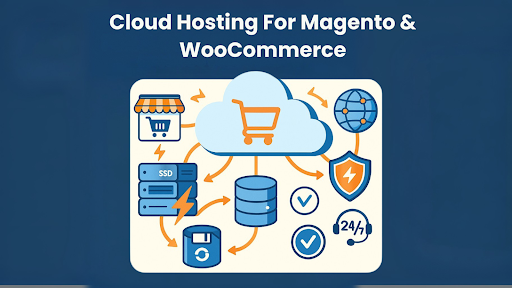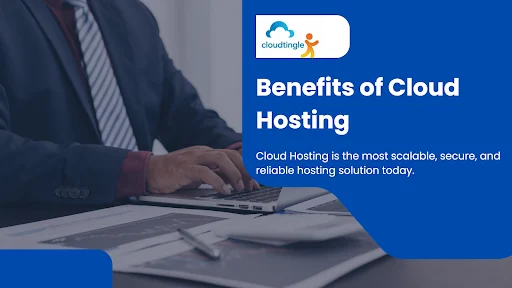One of the most important choices you will make when starting a new software-as-a-service (SaaS) business is where and how to host your application. The dependability, speed, and user experience of your product are all built on hosting. Due to its affordability, shared hosting has historically been the most popular choice for novices. However, cloud hosting is now the preferred option for SaaS startups that require robust security, scalability, and stability.
Let’s compare shared and cloud hosting in terms of stability, flexibility, performance, security, upgrades, and packages to see why SaaS companies are moving toward cloud hosting.
What is Shared Hosting?
With shared hosting, a single physical server that hosts numerous other websites also houses your application or website. The CPU, RAM, bandwidth, and storage are all shared by all the sites.
- Ideal for: Personal projects, blogs, and small websites.
- Limitations: Higher security risks, slower performance, and fewer resources.
- Cost: Very inexpensive, typically only a few dollars a month.
What is Cloud Hosting?
Cloud computing makes use of a network of virtual servers that pull resources from multiple physical PCs. Instead of relying on just one server, your SaaS application is supported by a collection of servers that work together.
Best For: E-commerce platforms, startups, SaaS apps, and high-traffic websites.
Advantages: incredibly safe, scalable, and dependable.
Pricing: Pay-as-you-go or flexible packages; slightly more costly than shared hosting, but far more capable.
Data Recency & Stability
Shared Hosting: Because you rely on the general well-being of a single server, stability can be problematic. Your site may lag or even crash if another website on the server has a spike in traffic or is compromised. There is little data synchronization.
Because resources are dispersed, Cloud Hosting is incredibly stable. Another server takes over right away if one fails. Multiple machines’ data is synchronized, guaranteeing recentness and lowering the possibility of outages.
Security, Encryption & Firewalls
Shared hosting includes SSL support and rudimentary firewalls.However, since multiple users share the same environment, a compromised site could put others at risk. It lacks advanced DDoS defense, malware detection, and enterprise-grade encryption.
Cloud hosting offers advanced, multi-layered security features like intrusion detection, specialized firewalls, end-to-end encryption, and continuous monitoring. Data isolation ensures that other platform users won’t affect your SaaS app. For businesses handling sensitive user data, cloud hosting is far more secure.
Flexibility & Customization
Shared hosting offers very little flexibility. The server environment is not freely configurable, and custom applications might not function.
Cloud hosting offers great flexibility. You can install software, set up servers, and alter the CPU, memory, or storage, depending on your requirements. This is essential for SaaS startups that might need microservices, APIs, or custom databases.
Upgrades, Downgrades & Scalability
Shared Hosting: Upgrading typically entails moving to a totally different plan, such as dedicated or VPS hosting. Downtime may result from this complicated migration. Reducing is just as challenging.
Cloud Hosting: smooth downgrades and upgrades. Resources can be immediately scaled down to save money or scaled up during periods of high traffic. SaaS startups favor cloud hosting because of its elasticity, which allows it to expand with your company.
Performance & Speed
Shared Hosting: User activity has a significant impact on performance. Your SaaS app will lag if one website uses excessive amounts of resources. Inconsistent loading times can irritate end users.
Cloud Hosting: Performance is significantly faster and more dependable because traffic is split among several servers. Content Delivery Networks, or CDNs, are another tool used by cloud providers to quickly and efficiently distribute content throughout the world. Quick response times are critical to retaining users for SaaS startups.
Site Availability & Uptime
Shared hosting is susceptible to outages during periods of high traffic or server problems. Although 99.98% uptime is promised by many providers, outages are frequent in practice.
Cloud hosting: Provides uptime guarantees of 99.98% or greater. There is little chance of downtime because your application is backed up on multiple servers. For SaaS startups, where even a brief outage can result in lost revenue and user trust, this high availability is essential.
Packages & Pricing Differences
- Shared Hosting Packages:
- Very reasonably priced, often starting at $2 to $5 a month.
- Resources that are fixed and have limited bandwidth and storage.
- Often includes basic SSL, a control panel, and email hosting.
- Perfect for tiny, low-traffic websites.
- Cloud Hosting Packages:
- Subscription-based or pay-as-you-go pricing.
- Extremely customizable; you only pay for the precise amount of RAM, CPU, and storage that you require.
- AWS, Google Cloud, and Azure are among the providers that provide startups with free credits.
- Ideal for growing applications where expenses correspond with consumption.
Why SaaS Startups Prefer Cloud Hosting
For SaaS companies to retain customers and lower attrition, dependability, speed, and security are essential. While shared hosting may initially save money, as the user base increases, it soon becomes a bottleneck. Cloud hosting provides:
- Scalability: Resources can be added or decreased instantly.
- High Performance: Better reaction times and faster speeds.
- Strong Security: Firewalls and enterprise-level encryption.
- Global Availability: Low latency is guaranteed by data centers worldwide.
- Cost Effectiveness: Don’t overpay for capacity that isn’t used; only pay for what you use.
Conclusion
For small business websites and personal blogs, shared hosting is adequate and cost-effective. But for SaaS startups that want to offer a faultless user experience, cloud hosting is the obvious option. It provides the speed, stability, flexibility, and security that are essential for expanding and competing in today’s fast-paced digital world.
To put it simply, shared hosting is inexpensive, entry-level, and restricted.
Cloud hosting is scalable, safe, and designed to expand.
Because of this, cloud hosting is the primary choice of contemporary SaaS startups for the foundation of their business. SaaS startups may also be able to benefit from Hostzop’s enterprise-grade security, fast performance, scalable cloud hosting, and 99.98% uptime. With flexible packages, pay-as-you-grow pricing, and 24/7 expert support, startups can effortlessly upgrade or downgrade resources, ensuring cost effectiveness and dependability while focusing on product development rather than server management.






